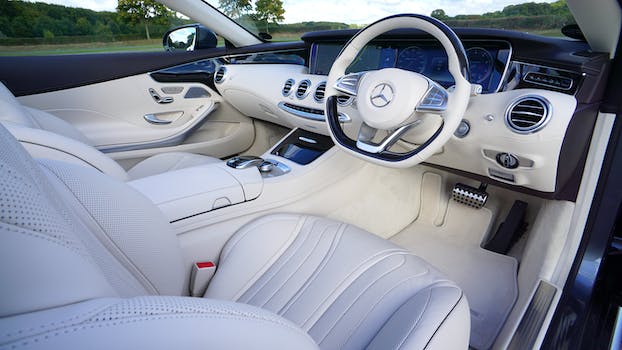How To Save Money When Buying A Car
“Smart tips for savvy car buyers: How to save money on your next ride.”
Introduction
Introduction: Buying a car is a significant investment, and it’s essential to save money wherever possible. There are several ways to save money when buying a car, from negotiating the price to considering financing options. In this article, we will discuss some tips on how to save money when buying a car.
Negotiating the Price with the Dealer
Buying a car can be an exciting experience, but it can also be a stressful one, especially when it comes to negotiating the price with the dealer. However, with a little bit of preparation and knowledge, you can save yourself a lot of money and make the process much smoother.
Firstly, it’s important to do your research before you even step foot in a dealership. Look up the make and model of the car you’re interested in, and find out what the average price is in your area. This will give you a good idea of what to expect and what a fair price would be. You can also use this information to negotiate with the dealer.
When you’re at the dealership, don’t be afraid to ask questions and take your time. The salesperson may try to rush you into making a decision, but it’s important to take your time and make sure you’re getting the best deal possible. Ask about any discounts or promotions that may be available, and be prepared to walk away if you’re not happy with the price.
One tactic that can be effective when negotiating the price is to start low and work your way up. Make an offer that’s lower than what you’re willing to pay, and see if the dealer is willing to negotiate. If they’re not, you can always increase your offer until you reach a price that you’re both happy with.
Another tactic is to negotiate the price of the car separately from any financing or trade-in deals. This can help you get a better idea of what you’re actually paying for the car, and can also help you avoid any hidden fees or charges.
It’s also important to be aware of any additional fees or charges that may be added to the price of the car. These can include things like documentation fees, delivery fees, and advertising fees. Make sure you ask about these upfront, and negotiate them if possible.
Finally, don’t be afraid to walk away if you’re not happy with the price. There are plenty of other dealerships and cars out there, and you don’t want to end up paying more than you can afford or getting a car that you’re not happy with.
In conclusion, negotiating the price with a car dealer can be a daunting task, but with a little bit of preparation and knowledge, you can save yourself a lot of money and make the process much smoother. Do your research, ask questions, and be prepared to walk away if you’re not happy with the price. With these tips in mind, you’ll be well on your way to getting a great deal on your next car.
Researching and Comparing Car Prices

Buying a car can be a daunting task, especially when it comes to the financial aspect. However, with a little bit of research and comparison, you can save a significant amount of money. In this article, we will discuss how to research and compare car prices to help you make an informed decision and save money.
The first step in researching car prices is to determine your budget. You need to know how much you can afford to spend on a car before you start looking. This will help you narrow down your options and avoid overspending. Once you have a budget in mind, you can start researching different car models and their prices.
One of the best ways to research car prices is to use online resources. There are many websites that allow you to compare prices of different car models from various dealerships. These websites also provide information on the features and specifications of each car, which can help you make an informed decision. Some popular websites for car research include Edmunds, Kelley Blue Book, and Cars.com.
Another way to research car prices is to visit local dealerships and take a test drive. This will give you a firsthand experience of the car and help you determine if it is the right fit for you. While at the dealership, you can also ask the salesperson about the price of the car and any available discounts or promotions.
Once you have researched different car models and their prices, it is time to start comparing. Comparing car prices can help you find the best deal and save money. One way to compare prices is to create a spreadsheet and list the prices of different car models from various dealerships. This will help you see the price differences and determine which dealership offers the best deal.
Another way to compare car prices is to negotiate with the dealership. Many dealerships are willing to negotiate the price of a car, especially if you have done your research and know the fair market value of the car. You can also ask the dealership about any available discounts or promotions that can help you save money.
It is important to remember that the price of a car is not the only factor to consider when making a purchase. You should also consider the cost of insurance, maintenance, and fuel efficiency. These factors can significantly impact the overall cost of owning a car.
In conclusion, researching and comparing car prices can help you save money when buying a car. By determining your budget, researching different car models, and comparing prices, you can make an informed decision and find the best deal. Remember to also consider other factors such as insurance, maintenance, and fuel efficiency when making a purchase. With a little bit of effort and research, you can save a significant amount of money when buying a car.
Buying a Used Car Instead of a New One
Buying a car is a big investment, and it’s important to make sure you’re getting the best deal possible. One way to save money when buying a car is to consider purchasing a used car instead of a new one. While some people may be hesitant to buy a used car, there are many benefits to doing so.
First and foremost, buying a used car is often much cheaper than buying a new one. New cars can lose a significant amount of their value as soon as they’re driven off the lot, while used cars have already gone through this initial depreciation. This means that you can often get a great deal on a used car that’s only a few years old.
Another benefit of buying a used car is that you have a wider selection to choose from. When you’re looking for a new car, you’re limited to the models that are currently being produced. With a used car, you can choose from a variety of makes and models, including ones that may no longer be in production.
Of course, there are some risks involved with buying a used car. You’ll want to make sure that you’re buying from a reputable dealer or private seller, and that the car has been well-maintained. It’s also a good idea to have the car inspected by a mechanic before you make a purchase, to ensure that there are no hidden issues.
When you’re shopping for a used car, there are a few things to keep in mind. First, consider the age and mileage of the car. While a car with low mileage may seem like a better deal, it’s important to remember that a car that’s been sitting for a long time can also have issues. Similarly, a car with high mileage may have more wear and tear, but if it’s been well-maintained, it could still be a good option.
You’ll also want to consider the overall condition of the car. Look for signs of rust or damage, and make sure that all of the features and systems are in good working order. Take the car for a test drive to get a feel for how it handles, and make sure that you’re comfortable with the way it drives.
When it comes to financing a used car, there are a few options available. You can often get a loan from a bank or credit union, or you may be able to finance through the dealership. Keep in mind that interest rates may be higher for used cars, so it’s important to shop around and compare rates before making a decision.
Overall, buying a used car can be a great way to save money when you’re in the market for a new vehicle. With a little bit of research and some careful consideration, you can find a car that meets your needs and fits within your budget. So if you’re in the market for a new car, consider looking at used options – you may be surprised at what you find!
Considering Financing Options and Interest Rates
Buying a car can be a significant investment, and it’s essential to consider all the financing options available to you. One of the most important factors to consider when financing a car is the interest rate. The interest rate is the amount of money you’ll pay on top of the principal amount borrowed. The higher the interest rate, the more you’ll pay in total over the life of the loan. Here are some tips on how to save money when buying a car by considering financing options and interest rates.
Firstly, it’s essential to shop around for the best interest rates. Different lenders offer different interest rates, and it’s crucial to compare them to find the best deal. You can start by checking with your bank or credit union, as they may offer lower interest rates to their members. You can also check with online lenders, as they may offer competitive rates as well.
Another way to save money on interest rates is to improve your credit score. Lenders use your credit score to determine your creditworthiness, and a higher credit score can lead to lower interest rates. You can improve your credit score by paying your bills on time, keeping your credit card balances low, and avoiding opening too many new credit accounts.
When considering financing options, it’s also important to consider the length of the loan. A longer loan term may result in lower monthly payments, but it also means you’ll pay more in interest over the life of the loan. A shorter loan term may result in higher monthly payments, but you’ll pay less in interest overall. It’s essential to find a balance between a manageable monthly payment and a reasonable total cost.
Another financing option to consider is a pre-approved loan. A pre-approved loan is a loan that you’ve already been approved for before you start shopping for a car. This can give you more negotiating power when it comes to the price of the car, as you’ll already have financing in place. It can also save you time and hassle at the dealership, as you won’t have to go through the financing process there.
Finally, it’s important to read the fine print when it comes to financing a car. Make sure you understand all the terms and conditions of the loan, including any fees or penalties for early repayment. You should also be aware of any add-ons or extras that the dealership may try to sell you, such as extended warranties or gap insurance. These can add to the total cost of the loan and may not be necessary.
In conclusion, there are many ways to save money when buying a car by considering financing options and interest rates. Shopping around for the best interest rates, improving your credit score, finding a balance between loan term and total cost, considering pre-approved loans, and reading the fine print can all help you save money in the long run. By taking the time to research and compare your options, you can find the best financing deal for your needs and budget.
Avoiding Add-Ons and Extras during the Purchase Process
Buying a car can be an exciting experience, but it can also be a costly one. With so many add-ons and extras available during the purchase process, it’s easy to get carried away and end up spending more than you intended. However, there are ways to save money when buying a car, and one of them is by avoiding add-ons and extras.
Firstly, it’s important to understand what add-ons and extras are. Add-ons are additional features that can be added to a car, such as a sunroof or a navigation system. Extras, on the other hand, are services that are offered by the dealership, such as extended warranties or maintenance plans. While these add-ons and extras may seem appealing, they can add up quickly and significantly increase the overall cost of the car.
One way to avoid add-ons and extras is to do your research before going to the dealership. By knowing what features you want in a car, you can avoid being swayed by salespeople who may try to convince you to add unnecessary features. Additionally, you can research the cost of these features and determine whether they are worth the extra expense.
Another way to avoid add-ons and extras is to negotiate with the dealership. Many dealerships will offer add-ons and extras as part of a package deal, but you can negotiate to have them removed or reduced in price. This can be done by simply asking the salesperson if they can remove the add-ons or offer a discount on the extras.
It’s also important to read the fine print when it comes to extras such as extended warranties or maintenance plans. These services may seem like a good idea at the time, but they may not be necessary or cost-effective in the long run. For example, an extended warranty may only cover certain parts of the car and may not be worth the extra expense. Similarly, a maintenance plan may only cover basic services that can be done at a lower cost elsewhere.
Finally, it’s important to remember that add-ons and extras are not the only way to customize a car. There are many aftermarket options available that can be added to a car after purchase, such as a new stereo system or custom rims. These options may be more cost-effective and can be added at a later time when finances allow.
In conclusion, buying a car can be a costly experience, but it doesn’t have to be. By avoiding add-ons and extras, doing your research, negotiating with the dealership, reading the fine print, and considering aftermarket options, you can save money and still get the car of your dreams. Remember, it’s important to stay focused on what you need in a car and not get swayed by unnecessary features that can add up quickly. Happy car shopping!
Conclusion
Conclusion: Saving money when buying a car requires research, negotiation skills, and patience. By doing your homework, comparing prices, considering alternative financing options, and being willing to walk away from a deal that doesn’t meet your needs, you can save thousands of dollars on your next car purchase.





